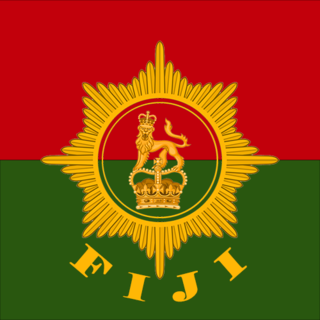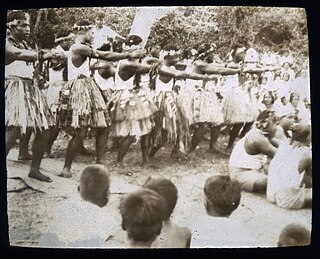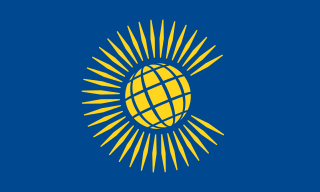Related Research Articles

The Republic of Fiji Military Forces is the military force of the Pacific island nation of Fiji. With a total manpower of about 6,500 active soldiers and approximately 6,200 reservists, it is one of the smallest militaries in the world and the third largest in the South Pacific region. The Ground Force is organised into six infantry and one engineer battalions.

Fiji has experienced many coups recently, in 1987, 2000, and 2006. Fiji has been suspended various times from the Commonwealth of Nations, a grouping of mostly former British colonies. It was readmitted to the Commonwealth in December 2001, following the parliamentary election held to restore democracy in September that year, and has been suspended again because of the 2006 coup, but has been readmitted a second time after the 2014 election. Other Pacific Island governments have generally been sympathetic to Fiji's internal political problems and have declined to take public positions.

Fiji, officially the Republic of Fiji, is an island country in Melanesia, part of Oceania in the South Pacific Ocean. It lies about 1,100 nautical miles north-northeast of New Zealand. Fiji consists of an archipelago of more than 330 islands—of which about 110 are permanently inhabited—and more than 500 islets, amounting to a total land area of about 18,300 square kilometres (7,100 sq mi). The most outlying island group is Ono-i-Lau. About 87% of the total population of 924,610 live on the two major islands, Viti Levu and Vanua Levu. About three-quarters of Fijians live on Viti Levu's coasts, either in the capital city of Suva, or in smaller urban centres such as Nadi or Lautoka. The interior of Viti Levu is sparsely inhabited because of its terrain.

The Islamic Republic of Pakistan emerged as an independent country through the partition of India in August 1947 and was admitted as a United Nations member state in September 1947. It is currently the second-largest country within the Muslim world in terms of population, and is also the only Muslim-majority country in possession of nuclear weapons. De facto, the country shares direct land borders with India, Iran, Afghanistan, and China.

Tuvalu, formerly known as the Ellice Islands, is an island country in the Polynesian subregion of Oceania in the Pacific Ocean, about midway between Hawaii and Australia. It lies east-northeast of the Santa Cruz Islands, northeast of Vanuatu, southeast of Nauru, south of Kiribati, west of Tokelau, northwest of Samoa and Wallis and Futuna, and north of Fiji.
Special Branch is a label customarily used to identify units responsible for matters of national security and intelligence in British, Commonwealth, Irish, and other police forces. A Special Branch unit acquires and develops intelligence, usually of a political or sensitive nature, and conducts investigations to protect the State from perceived threats of subversion, particularly terrorism and other extremist political activity.

The Pacific Community (PC), formerly the South Pacific Commission (SPC), is an international development organisation governed by 27 members, including 22 Pacific island countries and territories around the Pacific Ocean. The organisation's headquarters are in Nouméa, New Caledonia, and it has regional offices in Suva, Pohnpei, and Port Vila, as well as field staff in other locations in the Pacific. Its working languages are English and French. It primarily provides technical and scientific advice, and acts as a conduit for funding of development projects from donor nations. Unlike the slightly smaller Pacific Islands Forum, PaciCom is not a trade bloc, and does not deal with military or security issues.

The Pacific Islands Forum (PIF) is an inter-governmental organization that aims to enhance cooperation among countries and territories of Oceania, including formation of a trade bloc and regional peacekeeping operations. It was founded in 1971 as the South Pacific Forum (SPF), and changed its name in 1999 to "Pacific Islands Forum", so as to be more inclusive of the Forum's Oceania-spanning membership of both north and south Pacific island countries, including Australia. It is a United Nations General Assembly observer.

Fijians are a nation and ethnic group native to Fiji, who speak Fijian and English and share a common history and culture.
The Fiji Times is a daily English-language newspaper published in Suva, Fiji. Established in Levuka on 4 September 1869 by George Littleton Griffiths, it is Fiji's oldest newspaper still operating.

Nadroga-Navosa is one of the fourteen provinces of Fiji and one of eight based in Viti Levu, Fiji's largest island. It is about 2,385 square kilometers and occupies the South-West and Central areas of Viti Levu, Fiji's principal island. The province includes the Mamanuca Archipelago,Malolo Islands, off the west coast of Viti Levu, Vatulele, as well as the remote Conway Reef in the southwest. The population at the 2017 census was 58,931, being the fifth largest province. The main town in Nadroga-Navosa is Sigatoka, with a population of 9622.

The Commonwealth of Nations, often simply referred to as the Commonwealth, is an international association of 56 member states, the vast majority of which are former territories of the British Empire from which it developed. They are connected through their use of the English language and historical-cultural ties. The chief institutions of the organisation are the Commonwealth Secretariat, which focuses on intergovernmental relations, and the Commonwealth Foundation, which focuses on non-governmental relations between member nations. Numerous organisations are associated with and operate within the Commonwealth.
In April 2009, Fiji underwent a constitutional crisis when the Court of Appeal ruled that the 2006 Fijian coup d'état had been illegal. The Court dismissed the Interim Cabinet led by Prime Minister Frank Bainimarama that had governed Fiji since the coup. However, President Josefa Iloilo announced on a nationwide radio broadcast that he was abrogating the Constitution. He dismissed all judges and constitutional appointees, and reinstated Bainimarama and his cabinet. He also instituted emergency rule which increased police powers and allowed media censorship.
The Consumer Council of Fiji is a statutory consumer agency that promotes and lobbies for consumer rights and interests in the Fiji Islands.
Visa requirements for Fijian citizens are administrative entry restrictions by the authorities of other states placed on citizens of Fiji. As of 23 July 2024, Fijian citizens had visa-free or visa on arrival access to 90 countries and territories, ranking the Fijian passport 54th in terms of travel freedom according to the Henley Passport Index.

Severe Tropical Cyclone Nigel was the second of two tropical cyclones to affect Northern Vanuatu and the Fijian islands during January 1985. The system was first noted as an ill-defined low-pressure area ("low") located within the Intertropical Convergence Zone near the Cape York Peninsula. Over the next few days the low moved eastwards and increased in strength; it was named Nigel on January 16 as it developed into a tropical cyclone.

The COVID-19 pandemic in Fiji is part of the ongoing worldwide pandemic of coronavirus disease 2019 caused by severe acute respiratory syndrome coronavirus 2. The first case of the disease in Fiji was reported on 19 March 2020 in Lautoka. as of 3 January 2022, the country has had a total of 55,009 cases as of which 2,417 are currently active and 702 deaths, with cases reported on all divisions of the country. Apart from the COVID-19 deaths, 621 COVID-19 positive patients have died from pre-existing non-COVID-19 related illnesses. In March 2021, Fiji became the first Pacific island country to receive COVID-19 vaccines through the COVAX initiative with frontline workers and first responders the first to be vaccinated. As of 2 January 2022, more than 600,000 (98%) Fijians have received their first jab of the vaccine and almost 560,000 (92%) Fijians have received their second jab and are fully vaccinated. To date, only the AstraZeneca vaccine, Moderna vaccine and the Pfizer BioNTech vaccine have been deployed in the country. The country have also administered booster shots. Vaccination is mandated, however only to the adult population.
The COVID-19 vaccination campaign began in Fiji on the first quarter of 2021 and will continue throughout the year with the goal of vaccinating all eligible Fijians. The government has made it mandatory for all eligible adults to take the COVID-19 vaccines.
References
- 1 2 3 4 Franks, Patricia C.; Bernier, Anthony (2018). The International Directory of National Archives. Rowman & Littlefield. pp. 126–127. ISBN 978-1-4422-7743-4.
- ↑ Fiji: Report. Fiji Ministry of Information. 1971. pp. 82, 94–95. OCLC 5013626.
- ↑ Jackson, Pat, ed. (2004). "International Notes". Archives and Manuscripts . 32 (1). Australian Society of Archivists: 219–220.
- ↑ "National Archives Goes Online". Fiji Sun. Retrieved 7 January 2020.